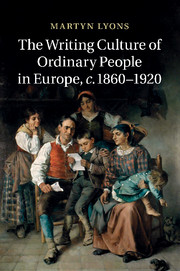Book contents
- Frontmatter
- Contents
- Illustrations
- Maps
- Acknowledgements
- Note on translations and transcriptions
- 1 Ordinary writings, extraordinary authors
- 2 Archives for an alternative history
- 3 ‘Excuse my bad writing’
- 4 Literary temptations
- 5 France
- 6 France
- 7 Family, village and motherland in the writing of Italian soldiers, 1915–1918
- 8 Italian identities ‘from below’ and ordinary writings from the Trentino
- 9 Love, death and writing on the Italian front, 1915–1918
- 10 Spain
- 11 Family strategy and individual identities in the letters of Spanish emigrants
- 12 Order and disorder in the ‘memory books’
- 13 Conclusions
- Bibliography
- Index
- References
6 - France
National identity from below and the discovery of the ‘lost provinces’, 1914–1919
Published online by Cambridge University Press: 05 November 2012
- Frontmatter
- Contents
- Illustrations
- Maps
- Acknowledgements
- Note on translations and transcriptions
- 1 Ordinary writings, extraordinary authors
- 2 Archives for an alternative history
- 3 ‘Excuse my bad writing’
- 4 Literary temptations
- 5 France
- 6 France
- 7 Family, village and motherland in the writing of Italian soldiers, 1915–1918
- 8 Italian identities ‘from below’ and ordinary writings from the Trentino
- 9 Love, death and writing on the Italian front, 1915–1918
- 10 Spain
- 11 Family strategy and individual identities in the letters of Spanish emigrants
- 12 Order and disorder in the ‘memory books’
- 13 Conclusions
- Bibliography
- Index
- References
Summary
Learning the language of patriotism
There were many reasons why France’s peasant army ‘held’ on the western front, whereas the armies of Austria-Hungary disintegrated, and Russia’s collapsed in revolution. In spite of invasion and enormous casualties, the troops saw through the winter of 1917 because they knew there had been a good harvest. They were re-assured, too, by rising prices for agricultural produce during the war years, as Becker has demonstrated. In addition, it is often argued, the work of national integration had been effective. The inculcation of national and republican values in the new government schools of the 1880s and 1890s bore fruit in the ‘patriotic resignation’ which endured the war. School manuals had brought about a silent revolution, legitimising national values, as well as unifying classes and regions in a common cause and a shared heritage.
No doubt the sheer volume of correspondence considered here is in itself evidence in support of this thesis. The language of contempt for the enemy, the ‘Boches’, who were vermin, bestial, bandits and pirates, suggested that the classroom lessons of revanchisme had indeed been well absorbed. The work of national unification, however, was as yet imperfect, and certain fault-lines within the nation remained visible in the soldiers’ correspondence. The problem of regionalism had not been completely resolved.
- Type
- Chapter
- Information
- Publisher: Cambridge University PressPrint publication year: 2012



